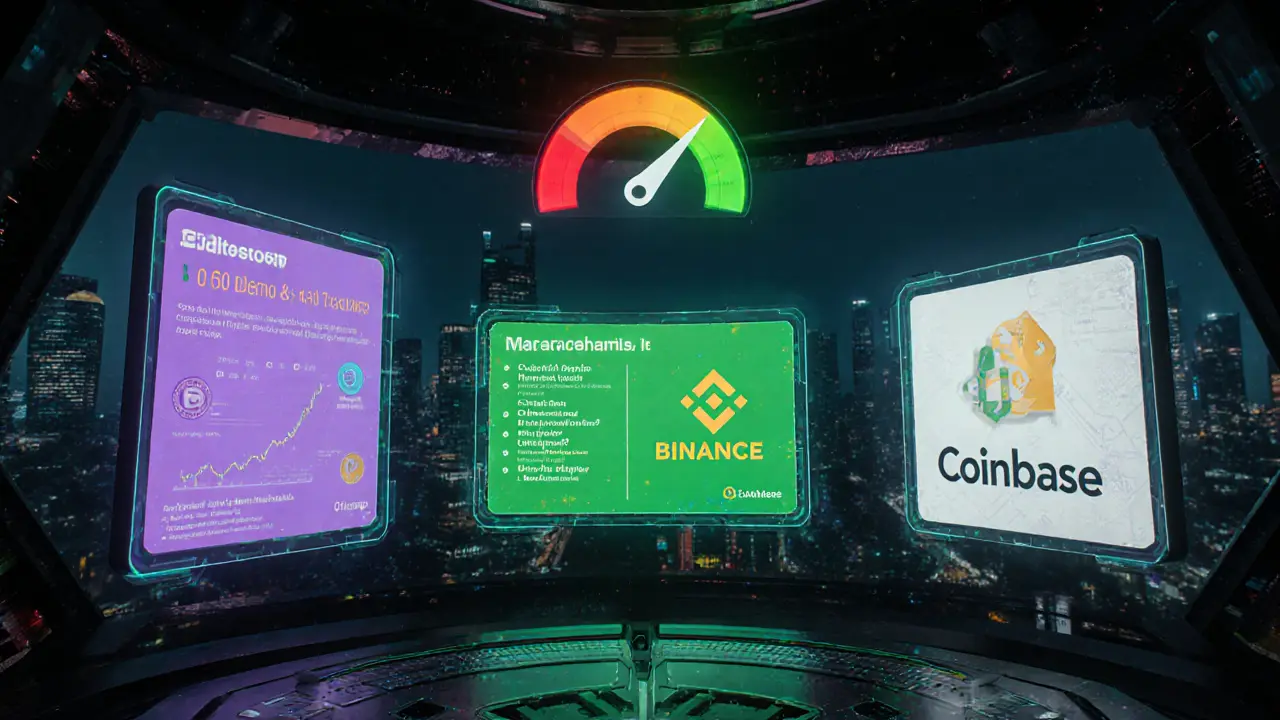BitStorage Exchange Risk Assessment Calculator
Risk Assessment Result
When you stumble upon a new crypto marketplace, the first question is: can you trust it with your hard‑earned coins? BitStorage is a centralized cryptocurrency exchange launched in 2018 and registered in Seychelles. It markets itself as a "secure & efficient crypto trading platform" that promises a wide range of coins, advanced order types, and extra perks like staking and demo trading.
What BitStorage Actually Offers
BitStorage’s product sheet lists more than 370 crypto assets on the Quick Exchange page, while the Spot Trading section claims support for over 500 coins. The discrepancy likely comes from counting methods - the quick tool may focus on the most liquid pairs, whereas the spot menu includes newer or lower‑volume tokens.
- Order types: market, limit, stop‑limit.
- Trading modes: spot, quick exchange, futures (limited availability).
- Extra services: staking, demo accounts, airdrop campaigns.
- User‑support: email desk and dedicated sales managers.
Key Features Explained
Below are the headline features BitStorage pushes in its marketing:
- Flexible trading options - You can place market, limit, or stop‑limit orders, which lets you chase price moves, set entry points, or protect against downside.
- Community perks - Regular promotions, referral bonuses, and occasional airdrops are advertised as ways to earn extra tokens.
- Security claims - BitStorage says it employs "top‑tier security measures" such as two‑factor authentication (2FA), cold‑wallet storage, and encrypted communications.
- Market analytics - Real‑time price charts, order‑book depth, and basic indicators are built into the web UI.
- Quick Exchange - A one‑click swap tool that promises instant conversion between supported coins.
Security: What’s Real and What’s Unverified
Security is the make‑or‑break factor for any exchange. BitStorage states it uses 2FA, SSL encryption, and keeps the bulk of user assets in cold storage. However, independent audits are missing. No third‑party security firm has published a formal assessment, and there are no public incident reports. This lack of external verification means you need to treat the claims cautiously.
Seychelles is a jurisdiction known for light‑touch crypto regulation. The registration there does not guarantee compliance with rigorous AML/KYC standards. Users should be prepared to provide identity documents and understand that legal recourse may be limited compared to exchanges based in the EU or the US.

Trading Experience: UI, Demo Account, and Quick Exchange
The platform’s UI follows a conventional layout: a left‑hand navigation bar, a central chart area, and an order‑entry panel. For beginners, the demo account is a useful sandbox - you get fake balances to practice market, limit, or stop‑limit entries without risking real capital.
Quick Exchange works like a built‑in DEX aggregator: you choose the source coin, the target coin, enter an amount, and the system shows the best available rate across its liquidity pools. It’s convenient for fast swaps but offers less control over slippage than a manual limit order.
Fees Structure
BitStorage does not publish a detailed fee schedule on its public pages. Community chatter suggests a maker‑taker model with typical rates around 0.2% for makers and 0.3% for takers, but without a transparent table you can’t be sure. Hidden fees - such as withdrawal charges that vary by blockchain - may also apply.
Customer Support and Community Interaction
Support is handled via email and a team of sales managers who claim to offer “meaningful conversations”. Response times reported by users on Reddit (where the exchange is occasionally mentioned) range from a few hours to a couple of days. There is no live chat or phone line, which is a drawback for traders who need immediate assistance during volatile market swings.

How BitStorage Stacks Up Against Major Exchanges
| Aspect | BitStorage | Binance / Coinbase |
|---|---|---|
| Year founded | 2018 | 2017 / 2012 |
| Regulatory jurisdiction | Seychelles (light‑touch) | Multiple (EU, US, etc.) |
| Coins listed | ≈ 500 | ≈ 2,000+ |
| Order types | Market, limit, stop‑limit | Market, limit, stop, stop‑limit, OCO, more |
| Security audits | None publicly disclosed | Regular third‑party audits |
| Customer support | Email + sales manager | 24/7 chat, phone, email |
In short, BitStorage offers a decent coin list and basic order functionality, but it lags behind the industry leaders on regulatory transparency, security verification, and support depth.
Pros and Cons Checklist
- Pros
- Wide range of assets (≈ 500)
- Demo trading for beginners
- Staking options directly on the platform
- One‑click Quick Exchange for fast swaps
- Cons
- Lack of independent security audit
- Unclear fee schedule
- Limited customer‑service channels
- Registered in a low‑regulation jurisdiction
Is BitStorage Worth Trying?
If you’re an experienced trader looking for a spot‑only platform with a decent selection of altcoins and you don’t mind doing your own due‑diligence, BitStorage can serve as an additional venue for diversification. Newcomers should start with the demo account, verify the withdrawal fees, and keep only a modest amount of capital on the exchange until they feel comfortable with the security posture.
For anyone who prioritizes regulatory safeguards, audited security, and 24/7 live support, more established exchanges like Binance, Kraken, or Coinbase remain safer choices.
Frequently Asked Questions
Does BitStorage have a mobile app?
At the time of writing, BitStorage only provides a web‑based interface. There is no dedicated iOS or Android app, so traders must use a mobile browser.
Can I withdraw crypto to an external wallet?
Yes, withdrawals are possible to any external address supported by the blockchain. Fees vary by network and are not listed on the front page.
Is there any insurance for funds held on BitStorage?
BitStorage does not publicly disclose any insurance coverage for user deposits, unlike some larger exchanges that offer partial protection.
How do I activate the demo trading mode?
After creating an account, click the “Demo” toggle on the dashboard. The system allocates virtual balances that can be used for practice trades.
What KYC documents are required?
BitStorage asks for a government‑issued ID, proof of address, and a selfie for facial verification before you can withdraw funds.
Cathy Ruff
October 2, 2025 AT 19:31BitStorage is a total joke, its so‑called “security” is nothing but marketing fluff, you’re better off burning your crypto than trusting a Seychelles‑registered shell.
Carthach Ó Maonaigh
October 3, 2025 AT 19:08Oh please, you sound like a broken meme coin hype machine, the only thing “flexing” on BitStorage is its empty promise page, grab a real exchange or keep whining.
Greer Pitts
October 4, 2025 AT 18:44i get why some folks might try it but i’d keep my stash small.
Jenise Williams-Green
October 5, 2025 AT 18:21While the allure of a wide‑range altcoin selection can be tempting, one must not sacrifice fundamental safety on the altar of convenience. BitStorage’s lack of independent audits is a glaring omission that cannot be glossed over with glossy marketing copy. Moreover, its registration in a lightly regulated jurisdiction raises legitimate concerns about consumer protection. Users with a conscience should demand transparency and verified security measures before entrusting any platform with their assets. In short, enthusiasm should be tempered with rigorous due diligence.
Rob Watts
October 6, 2025 AT 17:58Totally hear you, the demo mode is a solid way to test the waters without risking real funds.
Alex Gatti
October 7, 2025 AT 17:34What really matters is whether the platform’s fee structure actually aligns with low‑volume traders, because hidden withdrawal costs can eat into any potential gains.
Kimberly Kempken
October 8, 2025 AT 17:11Fees? Just another illusion to keep you guessing, the real cost is your trust.
Shaian Rawlins
October 9, 2025 AT 16:48The crypto ecosystem in 2025 has become a labyrinth of platforms each promising the moon, and BitStorage is no exception to that trend. Its user interface feels familiar enough for beginners, yet it hides several nuances that only seasoned traders tend to notice. For instance, the quick exchange feature operates like a built‑in aggregator, which can be handy for swift swaps but often fails to reveal the underlying slippage until after the trade is executed. The demo account is a commendable addition, allowing newcomers to practice market, limit, and stop‑limit orders without risking actual capital. However, the absence of a transparent fee schedule means users must rely on anecdotal reports to gauge trading costs, which is far from ideal. Community chatter suggests maker fees around 0.2 % and taker fees near 0.3 %, but without official documentation these numbers remain speculative. Security claims such as two‑factor authentication and cold storage sound reassuring on the surface, yet the lack of third‑party audits leaves a critical gap in verification. The jurisdiction of Seychelles does not impose the same rigorous AML/KYC standards found in EU or US‑based exchanges, potentially exposing users to regulatory uncertainty. Customer support, limited to email and sales managers, can be sluggish during high‑volatility periods, which is a notable drawback for traders who need immediate assistance. On the positive side, the platform does offer staking options directly within the web interface, adding a modest passive income avenue for asset holders. The asset list, boasting approximately 500 tokens, provides a decent variety compared to smaller niche exchanges, though it still trails behind industry giants. Withdrawal processes are functional, but network‑specific fees vary and are not pre‑displayed, requiring users to double‑check before confirming a transaction. In summary, BitStorage occupies a middle ground: it supplies essential trading tools and a demo environment while falling short on transparency and regulatory robustness. For risk‑averse individuals, the platform may serve as a supplementary venue for small‑scale experimentation rather than a primary hub for large capital. Ultimately, the decision to engage with BitStorage should hinge on a personal risk tolerance assessment and a willingness to perform thorough independent research.
Tyrone Tubero
October 10, 2025 AT 16:24One cannot simply equate token count with platform prestige; the true measure lies in institutional backing and audit provenance, both of which BitStorage sadly lacks.
Taylor Gibbs
October 11, 2025 AT 16:01yeah, i feel that too, maybe start small and see how the support actually reacts over time.
mukesh chy
October 12, 2025 AT 15:38Oh sure, because ignoring jurisdictional oversight has never backfired on anyone in crypto history, right?
Amal Al.
October 13, 2025 AT 15:14Indeed, it is critical to approach such platforms with caution; thorough due‑diligence, including reading the fine print, can safeguard one's assets, so please always verify the latest terms before proceeding.
Scott McReynolds
October 14, 2025 AT 14:51In the grand tapestry of financial innovation, each new exchange adds a thread that can either strengthen or weaken the whole. BitStorage, with its demo mode, offers an accessible entry point for those hesitant to dive headfirst. This educational aspect aligns with the broader goal of demystifying digital assets for the masses. At the same time, the platform’s opaque fee structure invites a healthy dose of skepticism. By engaging with the demo first, users can gauge the responsiveness of support and the reliability of withdrawal processes without risking capital. Moreover, staking opportunities provide an additional layer of utility for patient investors. Ultimately, the prudent path is to allocate a modest portion of one’s portfolio to BitStorage while maintaining the bulk on more established, heavily audited exchanges. Such a balanced approach respects both curiosity and caution.
John Corey Turner
October 15, 2025 AT 14:28Balancing curiosity with caution is indeed a wise philosophy; like navigating a maze, you need both a torch and a map to avoid unseen pitfalls.
Katherine Sparks
October 16, 2025 AT 14:04Dear community, it is my considered opinion that while BitStorage presents certain appealing features, a meticulous examination of its security protocols and regulatory standing is indispensable; therefore, I kindly encourage all members to proceed with due diligence and prudence :)